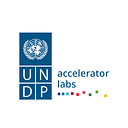No, the UN hasn’t reached its “use by” date
Gina Lucarelli, Maria Blanco and Mao Kawada
Migration, floods, water scarcity, violent extremism, diseases that spread more quickly due to increasing draughts. These are the types of real-world problems that undermine global development. They are problems that aren’t simple to solve. They are compounded by billions of actions and interactions. They change by the minute. They are complex. They are wicked.
These problems don’t respond to well-laid economic growth and development plans. They don’t respond to social mobilization alone. They can’t be analysed with 5-year-old data sets. And they won’t be solved by one shiny technological breakthrough.
It is understandable to look at the United Nations and feel that the organization is outdated. We need to open up and modernize as we hold tightly to the core principles upon which the UN was founded.
The future is already here…
Paraphrasing the great futurist and science fiction writer William Gibson, we do believe that the future United Nations is already here — It’s just not evenly distributed. While innovation programs have creeped into nearly every UN organization, none has led to a wholesale re-imagining of how to inject innovation in its DNA. At the United Nations Development Programme, we are doing this with the Accelerator Lab Network.
As a part of a larger push to bring innovation into the way our organization thinks, manages, delivers and invests, we are setting out to create the world’s largest and fastest learning network on wicked sustainable development challenges.
We are looking for learning options which are both serendipitous and driven by hypotheses to create actionable intelligence on complex development problems. We are designing portfolios with a full spectrum of regulatory, technological, behavioral, and participatory experiments to learn what combinations provide the right mix of solutions. And we are placing a premium on the value of contextual knowledge. Like many, our mantra these days is context, context, and context again.
But rethinking development in the face of the 4th industrial revolution can’t be done alone. Sharing this vision are the Federal Republic of Germany and the Qatar Fund for Development (QFFD), our two core investors. They will help us co-build the Accelerator Lab Network as a joint venture and we are grateful for trusting and investing in what we believe #NextGenUNDP is: an innovative, agile and inspiring organization.
The mappers, experimenters and explorers are coming…
Within UNDP change has begun. Right now, we are building a large team of explorers, experimenters and mappers as part of the Accelerator Labs serving 78 countries. We’re hopeful that by bringing in new expertise in ethnography, experimentation and data science, our learning loop will be faster. Our goal is to accelerate action that is already underway to be able to respond at the pace of today’s challenges.
We’re building a network of labs while also learning from the cautionary tales from previous generations of labs. We’ve taken those in and we are trying to design ways to drive innovation from the core, rather than transplanting it from the outside.
With this new mindset, everyone needs to own transformation, it can’t be just a part of someone’s terms of reference. And we are proud to see that this shift is already happening.
… and we can’t wait
Although the new teams for the Labs will be onboarding in the next two months, colleagues at UNDP can’t wait. The excitement is there. Action learning streams have kicked off in several country offices to test and refine some of the new approaches the Labs will use: sense making, collective intelligence, solutions mapping and experimentation.
The Democratic Republic of Congo, Zimbabwe, Lesotho and Moldova are testing out “solution safaris” to learn about grassroots innovations.
For collective intelligence, UNDP in Sierra Leone will test ways to address flooding in informal urban settlements through real-time people-generated data. In the Philippines, UNDP run a three day @hackthelab design studio with social innovation partners to focus on solutions for cleaning Manilla Bay.
Also, many of the 60 country offices are already engaging partners within government, civil society, academia, and the private sector. In Jordan, Lebanon, Malawi, Namibia and Nepal, colleagues organized Open Houses, Meet and Greets, and events to explore domestic innovation landscapes and potential areas for partnerships. Mali, Turkey, Ukraine, Zimbabwe, are also mapping their social innovation ecosystem.
Some of these conversations are high-level. In Congo, UNDP had the opportunity to discuss the Labs with the Prime Minister. In Azerbaijan, the Labs have helped led a new co-financing agreement with the government worth about USD 7 Million.
We could go on, we are just sharing the news from the last month! So yes, in UNDP, we are transforming how development works. And no, the UN hasn’t reached its “use by” date yet. Few organizations are so deeply involved in so many aspects of human life and global affairs, but the link between the UN and real people has often been remote. Tapping into local innovators and their knowledge and elevating it to address complex development challenges, might bring the UN closer to its roots: “We the peoples”.
